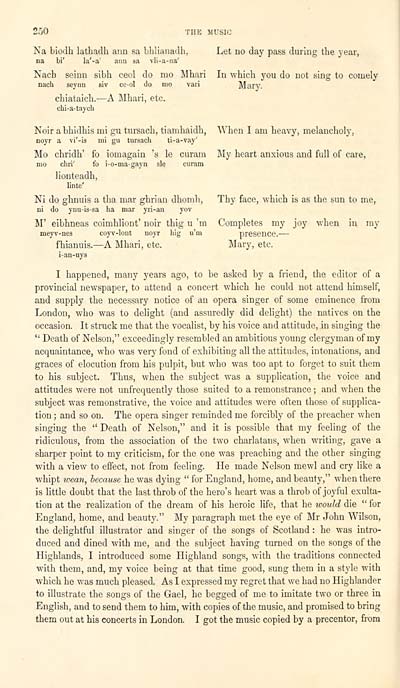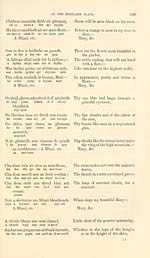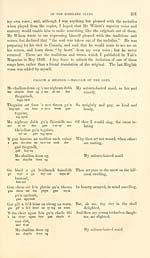Download files
Complete book:
Individual page:
Thumbnail gallery: Grid view | List view

250 THE MUSIC
Na biodh lathadh ann sa blilianadh, Let no day pass during the year,
na bi' la'-a' aim sa vli-a-ua'
Nacb seinn sibh ceol do mo JIhari In which you do not sing to comely
nach seynn siv ce-ol do mo vaii Mar}'.
chiataich. — A Mhari, etc.
chi-a-taycb
Noir abhidhis mi gu tursach, tiamhaidh, When I am heavy, melancholy,
noyr a vi'-is mi gu tursach ti-a-vay'
Mo chridh' fo iomagaiu 's le curam My heart anxious and full of care,
mo chri' fo i-o-ma-gayo sle curam
lionteadh,
linte'
Ni do ghnuis a tha mar ghrian dbomli, Thy face, which is as the sun to me,
ni do ynu-is-sa ha mar yri-au yov
M' eibhneas coimhliont' noir thig u 'm Completes my joy when in my
meyv-ues coyv-lont uoyr hig u'm presence. —
fhianuis. — A Mhari, etc. Mary, etc.
i-an-uya
I happened, many years ago, to be asked by a friend, the editor of a
provincial newspaper, to attend a concert which he could not attend himself,
and supply the necessary notice of an opera singer of some eminence from
London, who was to delight (aud assuredly did delight) the natives on the
occasion. It struck me that the vocalist, by his voice and attitude, in singing the
" Death of Nelson," exceedingly resembled an ambitious young clergyman of my
acquaintance, who was very fond of exhibiting all the attitudes, intonations, and
graces of elocution from bis pulpit, but who was too apt to forget to suit them
to his subject. Thus, when the subject was a supplication, the voice and
attitudes were not unfrequently those suited to a remonstrance ; and when the
subject was remonstrative, the voice and attitudes were often those of supplica-
tion ; and so on. The opera singer reminded me forcibly of the preacher when
singing the " Death of Nelson," and it is possible that my feeling of the
ridiculous, from the association of the two charlatans, when writing, gave a
sharper point to my criticism, for the one was preaching and the other singing
with a view to effect, not from feeling. He made Nelson mewl and cry like a
whipt wean, because he was dying " for England, home, and beauty," when there
is little doubt that the last throb of the hero's heart was a throb of joyful exulta-
tion at the realization of the dream of his heroic life, that he would die " for
England, home, and beautj^" My paragraph met the eye of Mr John Wilson,
the delightful illustrator and singer of the songs of Scotland : he was intro-
duced and dined with me, and the subject having turned on the songs of the
Highlands, I introduced some Highland songs, with the traditions connected
with them, and, my voice being at that time good, sung them in a style with
which he was much pleased. As I expressed my regret that we had no Highlander
to illustrate the songs of the Gael, be begged of me to imitate two or three in
English, and to send them to him, with copies of the music, and promised to bring
them out at his concerts in London. I got the music copied by a precentor, from
Na biodh lathadh ann sa blilianadh, Let no day pass during the year,
na bi' la'-a' aim sa vli-a-ua'
Nacb seinn sibh ceol do mo JIhari In which you do not sing to comely
nach seynn siv ce-ol do mo vaii Mar}'.
chiataich. — A Mhari, etc.
chi-a-taycb
Noir abhidhis mi gu tursach, tiamhaidh, When I am heavy, melancholy,
noyr a vi'-is mi gu tursach ti-a-vay'
Mo chridh' fo iomagaiu 's le curam My heart anxious and full of care,
mo chri' fo i-o-ma-gayo sle curam
lionteadh,
linte'
Ni do ghnuis a tha mar ghrian dbomli, Thy face, which is as the sun to me,
ni do ynu-is-sa ha mar yri-au yov
M' eibhneas coimhliont' noir thig u 'm Completes my joy when in my
meyv-ues coyv-lont uoyr hig u'm presence. —
fhianuis. — A Mhari, etc. Mary, etc.
i-an-uya
I happened, many years ago, to be asked by a friend, the editor of a
provincial newspaper, to attend a concert which he could not attend himself,
and supply the necessary notice of an opera singer of some eminence from
London, who was to delight (aud assuredly did delight) the natives on the
occasion. It struck me that the vocalist, by his voice and attitude, in singing the
" Death of Nelson," exceedingly resembled an ambitious young clergyman of my
acquaintance, who was very fond of exhibiting all the attitudes, intonations, and
graces of elocution from bis pulpit, but who was too apt to forget to suit them
to his subject. Thus, when the subject was a supplication, the voice and
attitudes were not unfrequently those suited to a remonstrance ; and when the
subject was remonstrative, the voice and attitudes were often those of supplica-
tion ; and so on. The opera singer reminded me forcibly of the preacher when
singing the " Death of Nelson," and it is possible that my feeling of the
ridiculous, from the association of the two charlatans, when writing, gave a
sharper point to my criticism, for the one was preaching and the other singing
with a view to effect, not from feeling. He made Nelson mewl and cry like a
whipt wean, because he was dying " for England, home, and beauty," when there
is little doubt that the last throb of the hero's heart was a throb of joyful exulta-
tion at the realization of the dream of his heroic life, that he would die " for
England, home, and beautj^" My paragraph met the eye of Mr John Wilson,
the delightful illustrator and singer of the songs of Scotland : he was intro-
duced and dined with me, and the subject having turned on the songs of the
Highlands, I introduced some Highland songs, with the traditions connected
with them, and, my voice being at that time good, sung them in a style with
which he was much pleased. As I expressed my regret that we had no Highlander
to illustrate the songs of the Gael, be begged of me to imitate two or three in
English, and to send them to him, with copies of the music, and promised to bring
them out at his concerts in London. I got the music copied by a precentor, from
Set display mode to: Large image | Transcription
Images and transcriptions on this page, including medium image downloads, may be used under the Creative Commons Attribution 4.0 International Licence unless otherwise stated. ![]()
| Early Gaelic Book Collections > Blair Collection > Treatise on the language, poetry, and music of the Highland clans > (262) |
|---|
| Permanent URL | https://digital.nls.uk/76239285 |
|---|
| Description | A selection of books from a collection of more than 500 titles, mostly on religious and literary topics. Also includes some material dealing with other Celtic languages and societies. Collection created towards the end of the 19th century by Lady Evelyn Stewart Murray. |
|---|
| Description | Selected items from five 'Special and Named Printed Collections'. Includes books in Gaelic and other Celtic languages, works about the Gaels, their languages, literature, culture and history. |
|---|

